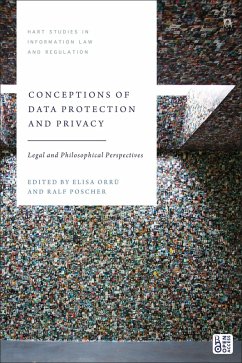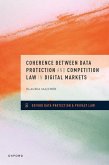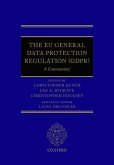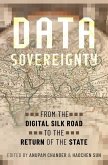Conceptions of Data Protection and Privacy
Legal and Philosophical Perspectives
Herausgeber: Orrù, Elisa; Keller, Perry; Poscher, Ralf; Aplin, Tanya
Versandkostenfrei innerhalb Deutschlands
141,99 €
inkl. MwSt.
Versandkostenfrei*
Erscheint vorauss. 8. Januar 2026
Melden Sie sich
hier
hier
für den Produktalarm an, um über die Verfügbarkeit des Produkts informiert zu werden.

71 °P sammeln
Conceptions of Data Protection and Privacy
Legal and Philosophical Perspectives
Herausgeber: Orrù, Elisa; Keller, Perry; Poscher, Ralf; Aplin, Tanya
- Gebundenes Buch
Provides a clear understanding of data protection and privacy and examines their social value amid political struggles and the AI revolution.
Andere Kunden interessierten sich auch für
![Privacy and Personal Data Protection Law in Asia Privacy and Personal Data Protection Law in Asia]() Privacy and Personal Data Protection Law in Asia199,99 €
Privacy and Personal Data Protection Law in Asia199,99 €![Coherence Between Data Protection and Competition Law in Digital Markets Coherence Between Data Protection and Competition Law in Digital Markets]() Klaudia MajcherCoherence Between Data Protection and Competition Law in Digital Markets120,99 €
Klaudia MajcherCoherence Between Data Protection and Competition Law in Digital Markets120,99 €![Vulnerability and Data Protection Law Vulnerability and Data Protection Law]() Gianclaudio MalgieriVulnerability and Data Protection Law120,99 €
Gianclaudio MalgieriVulnerability and Data Protection Law120,99 €![The Risk-Based Approach to Data Protection The Risk-Based Approach to Data Protection]() Raphaël GellertThe Risk-Based Approach to Data Protection137,99 €
Raphaël GellertThe Risk-Based Approach to Data Protection137,99 €![The EU General Data Protection Regulation (Gdpr) The EU General Data Protection Regulation (Gdpr)]() The EU General Data Protection Regulation (Gdpr)499,99 €
The EU General Data Protection Regulation (Gdpr)499,99 €![The Digital Markets ACT The Digital Markets ACT]() The Digital Markets ACT256,99 €
The Digital Markets ACT256,99 €![Data Sovereignty Data Sovereignty]() Data Sovereignty146,99 €
Data Sovereignty146,99 €-
-
-
Provides a clear understanding of data protection and privacy and examines their social value amid political struggles and the AI revolution.
Hinweis: Dieser Artikel kann nur an eine deutsche Lieferadresse ausgeliefert werden.
Hinweis: Dieser Artikel kann nur an eine deutsche Lieferadresse ausgeliefert werden.
Produktdetails
- Produktdetails
- Verlag: Bloomsbury Academic
- Seitenzahl: 512
- Erscheinungstermin: 8. Januar 2026
- Englisch
- Abmessung: 234mm x 156mm x 25mm
- Gewicht: 454g
- ISBN-13: 9781509983728
- ISBN-10: 1509983724
- Artikelnr.: 72489082
- Herstellerkennzeichnung
- Libri GmbH
- Europaallee 1
- 36244 Bad Hersfeld
- gpsr@libri.de
- Verlag: Bloomsbury Academic
- Seitenzahl: 512
- Erscheinungstermin: 8. Januar 2026
- Englisch
- Abmessung: 234mm x 156mm x 25mm
- Gewicht: 454g
- ISBN-13: 9781509983728
- ISBN-10: 1509983724
- Artikelnr.: 72489082
- Herstellerkennzeichnung
- Libri GmbH
- Europaallee 1
- 36244 Bad Hersfeld
- gpsr@libri.de
Elisa Orrù is Senior Researcher at the Max Planck Institute for the Study of Crime, Security and Law and Associate Professor at Freiburg University, Germany. Ralf Poscher is Director at the Max Planck Institute for the Study of Crime, Security and Law, Germany.
Introduction
Ralf Poscher (Max Planck Institute for the Study of Crime
Security and Law
Germany) Elisa Orrù (Max Planck Institute for the Study of Crime
Security and Law
Germany) Part I: Civil Rights
Fundamental Rights
or No Rights at All? Which Kinds of Rights Are Privacy and Data Protection and What Do They Actually Protect? 1. Privacy as a Civil Right. Some Reflections on Discrimination
Language and Politics
Anita Allen (University of Pennsylvania
USA) 2. Conceptualising the Protected Interests in Data Protection Law
Marion Albers (Hamburg University
Germany) 3. A Commentary on Marion Albers' Contribution
Johannes Masing (Freiburg University
Germany) 4. Is the Right to Data Protection a fundamental right? Ralf Poscher (Max Planck Institute for the Study of Crime
Security and Law
Germany) Part II: A Comparison of German
European and US-American Views Based on Constitutional Jurisprudence and Law 5. The Right to Informational Self-Determination
Gabriele Britz (Gießen University
Germany) 6. European Data Protection Law: Don't Let it Be (Forever) Misunderstood
Gloria Gonzalez-Fuster (Vrije Universiteit Brussel
Belgium) 7. An Exercise in Soul-Searching: Parsing the GDPR to Reveal the Meaning of Data Protection
Maria Grazia Porcedda (Trinity College Dublin
Ireland) 8. A Property-Based Understanding of Data Privacy Under the 4th Amendment
Neil Gorsuch (US Supreme Court) 9. Privacy Rights After Big Tech
Timothy Tymkovich (United States Foreign Intelligence Surveillance Court of Review) Part III: The Public and the Private: Privacy and Data Protection Beyond the Individual 10. Beyond the Individual: Privacy
Society
and Architectures of Power
Daniel Solove (George Washington University
USA) 11. Understanding the Opacity Concept in its Context
Paul De Hert (Vrije Universiteit Brussel
Belgium) 12. A Fundamental Data Protection Right - or Rather a Rule of Law 2.0? A Search for Clues in Judicial Procedural Law
Nikolaus Marsch (Saarland University
Germany) 13. On the Power of Shifting the Boundary between the Private and the Public
Beate Rössler (University of Amsterdam
Netherlands) Part IV: Privacy and Society. Democratic Values
Autonomy and Trust 14. AI Challenges to Privacy: the Inference Problem
Helen Nissenbaum (Cornell University
USA) 15. Privacy
Informational Self-Determination
and Autonomy
Elisa Orrù (Max Planck Institute for the Study of Crime
Security and Law
Germany) 16. Privacy in Light of Critiques of Autonomy
Tobias Matzner (Paderborn University
Germany) 17. Privacy
Trust
and Queer Youth
Ari Ezra Waldman (Northeastern University
USA) 18. Trust in Privacy Law
Johannes Eichenhofer (Leipzig University
Germany)
Ralf Poscher (Max Planck Institute for the Study of Crime
Security and Law
Germany) Elisa Orrù (Max Planck Institute for the Study of Crime
Security and Law
Germany) Part I: Civil Rights
Fundamental Rights
or No Rights at All? Which Kinds of Rights Are Privacy and Data Protection and What Do They Actually Protect? 1. Privacy as a Civil Right. Some Reflections on Discrimination
Language and Politics
Anita Allen (University of Pennsylvania
USA) 2. Conceptualising the Protected Interests in Data Protection Law
Marion Albers (Hamburg University
Germany) 3. A Commentary on Marion Albers' Contribution
Johannes Masing (Freiburg University
Germany) 4. Is the Right to Data Protection a fundamental right? Ralf Poscher (Max Planck Institute for the Study of Crime
Security and Law
Germany) Part II: A Comparison of German
European and US-American Views Based on Constitutional Jurisprudence and Law 5. The Right to Informational Self-Determination
Gabriele Britz (Gießen University
Germany) 6. European Data Protection Law: Don't Let it Be (Forever) Misunderstood
Gloria Gonzalez-Fuster (Vrije Universiteit Brussel
Belgium) 7. An Exercise in Soul-Searching: Parsing the GDPR to Reveal the Meaning of Data Protection
Maria Grazia Porcedda (Trinity College Dublin
Ireland) 8. A Property-Based Understanding of Data Privacy Under the 4th Amendment
Neil Gorsuch (US Supreme Court) 9. Privacy Rights After Big Tech
Timothy Tymkovich (United States Foreign Intelligence Surveillance Court of Review) Part III: The Public and the Private: Privacy and Data Protection Beyond the Individual 10. Beyond the Individual: Privacy
Society
and Architectures of Power
Daniel Solove (George Washington University
USA) 11. Understanding the Opacity Concept in its Context
Paul De Hert (Vrije Universiteit Brussel
Belgium) 12. A Fundamental Data Protection Right - or Rather a Rule of Law 2.0? A Search for Clues in Judicial Procedural Law
Nikolaus Marsch (Saarland University
Germany) 13. On the Power of Shifting the Boundary between the Private and the Public
Beate Rössler (University of Amsterdam
Netherlands) Part IV: Privacy and Society. Democratic Values
Autonomy and Trust 14. AI Challenges to Privacy: the Inference Problem
Helen Nissenbaum (Cornell University
USA) 15. Privacy
Informational Self-Determination
and Autonomy
Elisa Orrù (Max Planck Institute for the Study of Crime
Security and Law
Germany) 16. Privacy in Light of Critiques of Autonomy
Tobias Matzner (Paderborn University
Germany) 17. Privacy
Trust
and Queer Youth
Ari Ezra Waldman (Northeastern University
USA) 18. Trust in Privacy Law
Johannes Eichenhofer (Leipzig University
Germany)
Introduction
Ralf Poscher (Max Planck Institute for the Study of Crime
Security and Law
Germany) Elisa Orrù (Max Planck Institute for the Study of Crime
Security and Law
Germany) Part I: Civil Rights
Fundamental Rights
or No Rights at All? Which Kinds of Rights Are Privacy and Data Protection and What Do They Actually Protect? 1. Privacy as a Civil Right. Some Reflections on Discrimination
Language and Politics
Anita Allen (University of Pennsylvania
USA) 2. Conceptualising the Protected Interests in Data Protection Law
Marion Albers (Hamburg University
Germany) 3. A Commentary on Marion Albers' Contribution
Johannes Masing (Freiburg University
Germany) 4. Is the Right to Data Protection a fundamental right? Ralf Poscher (Max Planck Institute for the Study of Crime
Security and Law
Germany) Part II: A Comparison of German
European and US-American Views Based on Constitutional Jurisprudence and Law 5. The Right to Informational Self-Determination
Gabriele Britz (Gießen University
Germany) 6. European Data Protection Law: Don't Let it Be (Forever) Misunderstood
Gloria Gonzalez-Fuster (Vrije Universiteit Brussel
Belgium) 7. An Exercise in Soul-Searching: Parsing the GDPR to Reveal the Meaning of Data Protection
Maria Grazia Porcedda (Trinity College Dublin
Ireland) 8. A Property-Based Understanding of Data Privacy Under the 4th Amendment
Neil Gorsuch (US Supreme Court) 9. Privacy Rights After Big Tech
Timothy Tymkovich (United States Foreign Intelligence Surveillance Court of Review) Part III: The Public and the Private: Privacy and Data Protection Beyond the Individual 10. Beyond the Individual: Privacy
Society
and Architectures of Power
Daniel Solove (George Washington University
USA) 11. Understanding the Opacity Concept in its Context
Paul De Hert (Vrije Universiteit Brussel
Belgium) 12. A Fundamental Data Protection Right - or Rather a Rule of Law 2.0? A Search for Clues in Judicial Procedural Law
Nikolaus Marsch (Saarland University
Germany) 13. On the Power of Shifting the Boundary between the Private and the Public
Beate Rössler (University of Amsterdam
Netherlands) Part IV: Privacy and Society. Democratic Values
Autonomy and Trust 14. AI Challenges to Privacy: the Inference Problem
Helen Nissenbaum (Cornell University
USA) 15. Privacy
Informational Self-Determination
and Autonomy
Elisa Orrù (Max Planck Institute for the Study of Crime
Security and Law
Germany) 16. Privacy in Light of Critiques of Autonomy
Tobias Matzner (Paderborn University
Germany) 17. Privacy
Trust
and Queer Youth
Ari Ezra Waldman (Northeastern University
USA) 18. Trust in Privacy Law
Johannes Eichenhofer (Leipzig University
Germany)
Ralf Poscher (Max Planck Institute for the Study of Crime
Security and Law
Germany) Elisa Orrù (Max Planck Institute for the Study of Crime
Security and Law
Germany) Part I: Civil Rights
Fundamental Rights
or No Rights at All? Which Kinds of Rights Are Privacy and Data Protection and What Do They Actually Protect? 1. Privacy as a Civil Right. Some Reflections on Discrimination
Language and Politics
Anita Allen (University of Pennsylvania
USA) 2. Conceptualising the Protected Interests in Data Protection Law
Marion Albers (Hamburg University
Germany) 3. A Commentary on Marion Albers' Contribution
Johannes Masing (Freiburg University
Germany) 4. Is the Right to Data Protection a fundamental right? Ralf Poscher (Max Planck Institute for the Study of Crime
Security and Law
Germany) Part II: A Comparison of German
European and US-American Views Based on Constitutional Jurisprudence and Law 5. The Right to Informational Self-Determination
Gabriele Britz (Gießen University
Germany) 6. European Data Protection Law: Don't Let it Be (Forever) Misunderstood
Gloria Gonzalez-Fuster (Vrije Universiteit Brussel
Belgium) 7. An Exercise in Soul-Searching: Parsing the GDPR to Reveal the Meaning of Data Protection
Maria Grazia Porcedda (Trinity College Dublin
Ireland) 8. A Property-Based Understanding of Data Privacy Under the 4th Amendment
Neil Gorsuch (US Supreme Court) 9. Privacy Rights After Big Tech
Timothy Tymkovich (United States Foreign Intelligence Surveillance Court of Review) Part III: The Public and the Private: Privacy and Data Protection Beyond the Individual 10. Beyond the Individual: Privacy
Society
and Architectures of Power
Daniel Solove (George Washington University
USA) 11. Understanding the Opacity Concept in its Context
Paul De Hert (Vrije Universiteit Brussel
Belgium) 12. A Fundamental Data Protection Right - or Rather a Rule of Law 2.0? A Search for Clues in Judicial Procedural Law
Nikolaus Marsch (Saarland University
Germany) 13. On the Power of Shifting the Boundary between the Private and the Public
Beate Rössler (University of Amsterdam
Netherlands) Part IV: Privacy and Society. Democratic Values
Autonomy and Trust 14. AI Challenges to Privacy: the Inference Problem
Helen Nissenbaum (Cornell University
USA) 15. Privacy
Informational Self-Determination
and Autonomy
Elisa Orrù (Max Planck Institute for the Study of Crime
Security and Law
Germany) 16. Privacy in Light of Critiques of Autonomy
Tobias Matzner (Paderborn University
Germany) 17. Privacy
Trust
and Queer Youth
Ari Ezra Waldman (Northeastern University
USA) 18. Trust in Privacy Law
Johannes Eichenhofer (Leipzig University
Germany)







